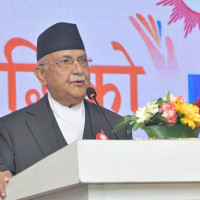- Friday, 20 February 2026
Asare tradition dwindling
By Kabiraj Ghimire,Hile, July 2: In the past, the arrival of the monsoon used to bring a unique charm to the villages.
People from all over the village would gather together for paddy planting, accompanied by the lively tunes of the traditional Naumati Baja.
They would sing Asare Bhaka in duet style while planting rice in a celebratory gathering known as ‘Bethi.’
It was also customary to build ‘Bhakari,’ and the sound of Asare Bhaka would echo throughout the village.
These days, such traditions are rarely seen.
The practice of playing Naumati Baja and singing Asare Bhaka in duet style by the lead singer (Bause) and the planters (Ropahar) during Bethi gatherings has virtually vanished.
The melodious Asare Bhaka is no longer heard during planting. The custom of building Bhakari is also fading. The tradition of playing musical instruments during rice planting has disappeared altogether.
According to Krishna Govinda Dhungana, a local from Ward No. 3 of Sangurigadhi Rural Municipality, these traditions that were once widely practised during rice planting in the monsoon are becoming alien to the current generation.
“Until around the year 1983, these traditions were very common, but they gradually started declining and have now disappeared,” said Dhungana.
Jhaptaman Adhikari, another local from Sangurigadhi-3, recalls how the rice planting process would begin only after all elements were ready, the muddy fields prepared in advance, enough water, seedlings ready for transplanting, dozens of oxen pairs, an equal number of Bauses and Ropahars, and a musical troupe.
The ritual of putting mud on the forehead (as a symbolic tika) and everyone working according to their role was a symbol of harmony between human life and the soil, recalled Adhikari.
Asar 15 offers a glimpse
The essence of that tradition is seen only once a year, on Asar 15 (this year marked on June 29).
Local governments, youth clubs, and schools organise cultural programmes on that day to revive the tradition.
According to Jitendra Rai, the chairperson of Sangurigadhi Rural Municipality, efforts are being made to preserve these customs.
“Every Asar 15, we join the farmers, arrange for traditional musical instruments, and encourage singing of old songs.
We may not be able to fully revive the old ways, but we try to recreate a glimpse of it,” said Rai.
Such events also excite the youth.
Pooja Adhikari, a resident of Sangurigadhi-3, said she feels a deep emotional connection when experiencing these traditions.
“When our parents share their experiences, we feel excited. Participating in the Asar 15 celebration gives us a sense of what the joyful atmosphere used to be like,” she said.















